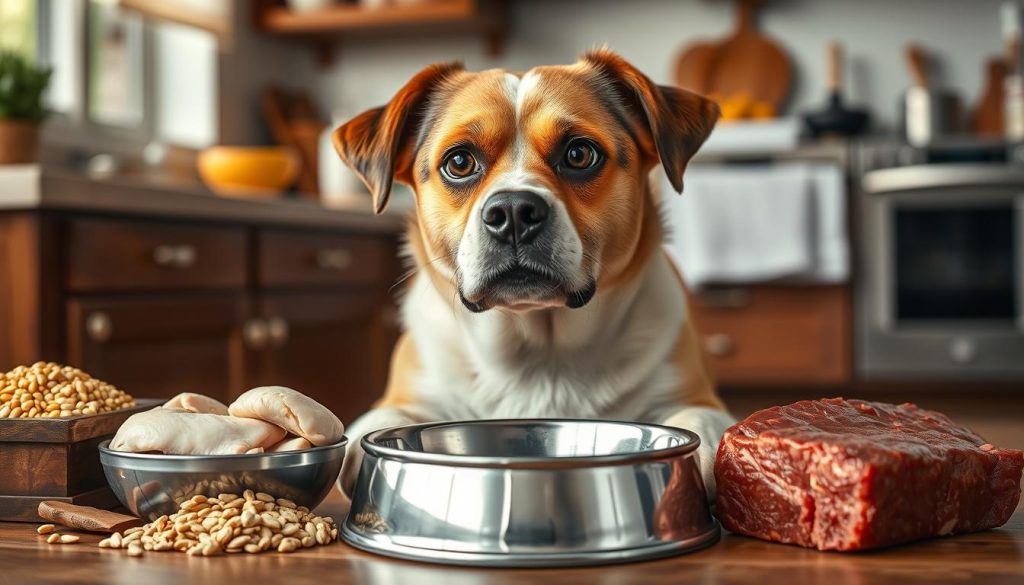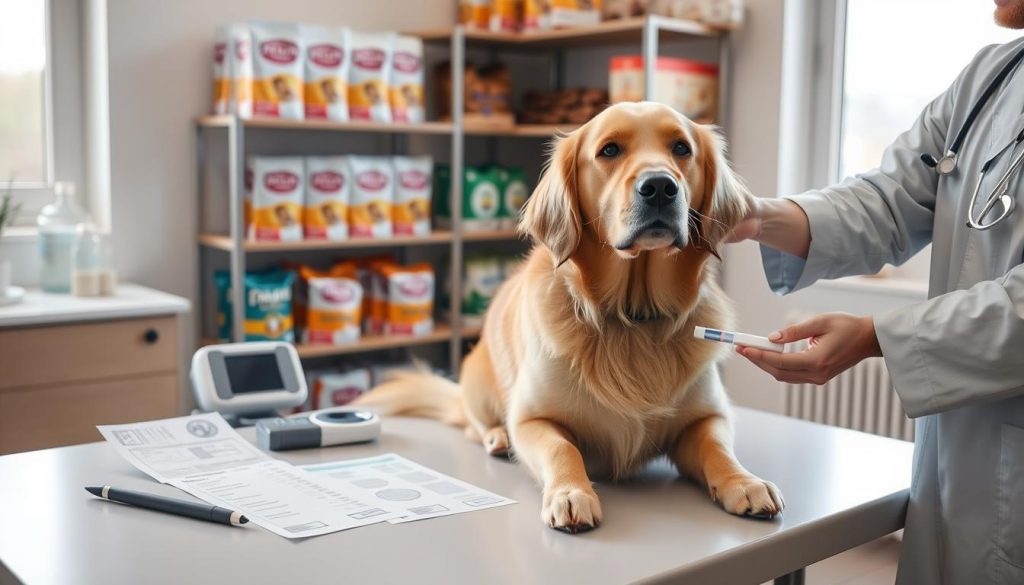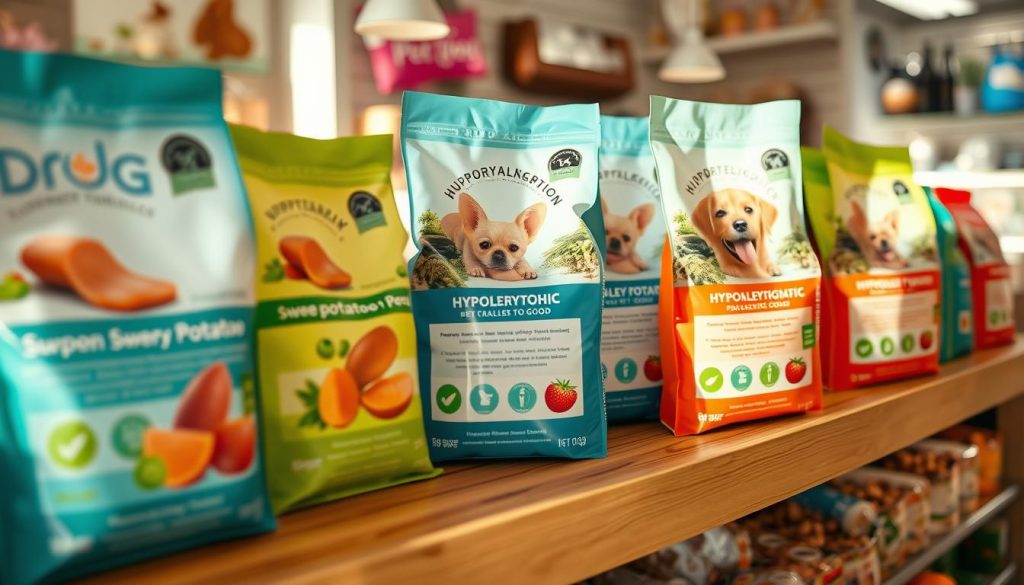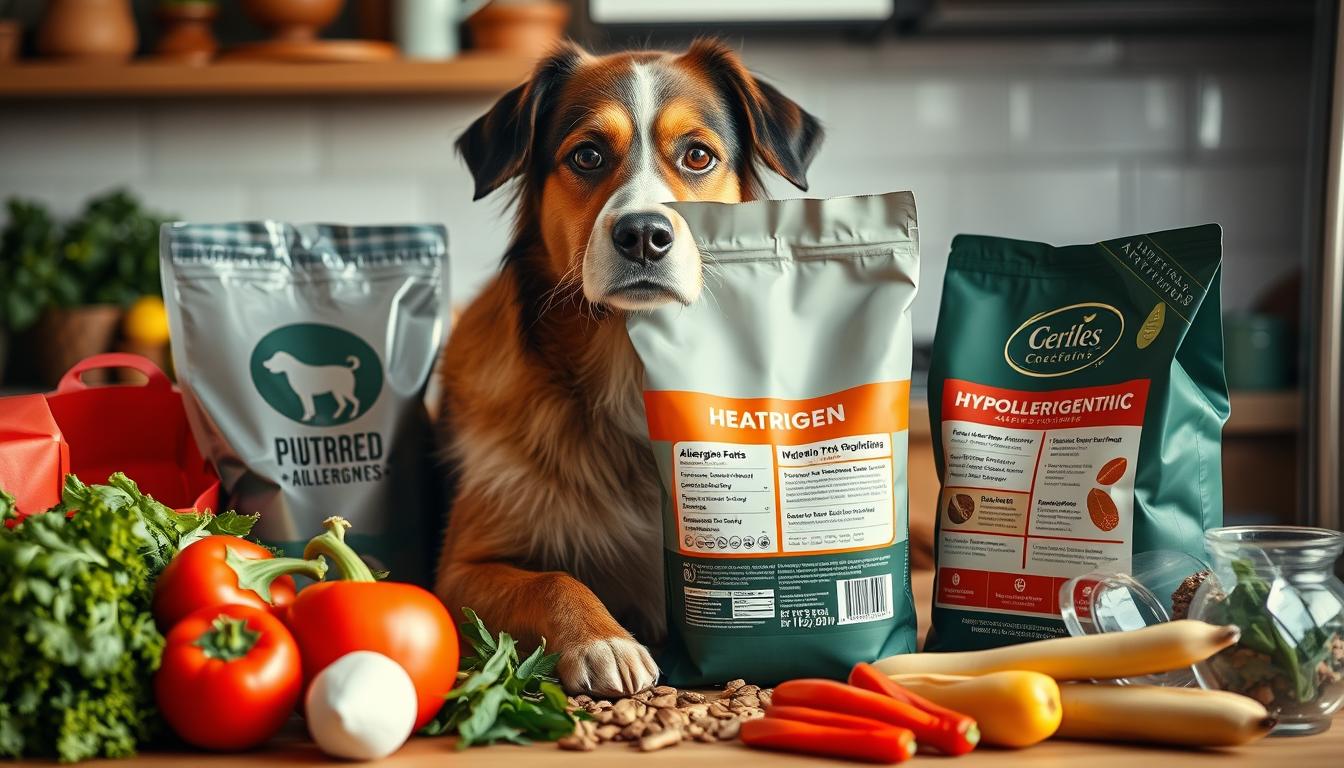As a pet owner, I know how upsetting dog food allergies can be. These allergies can make our pets uncomfortable and leave us searching for answers. But don’t worry, I’ve got you covered. In this guide, we’ll look at what causes dog food allergies, how to spot the signs, and how to help your dog feel better.
We’ll cover everything from common allergens in dog food to the best hypoallergenic options. I aim to give you the tools to tackle dog food allergies, food allergies in dogs, dog diet allergies, and canine food allergies. Let’s start this journey to find the best solution for your furry friend!
Understanding Dog Food Allergies
As a pet owner, it’s key to grasp dog food allergies. These allergies happen when a dog’s immune system reacts too strongly to certain proteins or ingredients. This can lead to a range of symptoms. Common allergens include beef, dairy, chicken, eggs, wheat, and soy.
What Are Dog Food Allergies?
Dog food allergies occur when a dog’s immune system sees food components as threats. This causes inflammation and various symptoms. These symptoms can affect a dog’s health and happiness.
Common Allergens in Dog Food
Common allergens in dog food are proteins like those in beef, dairy, chicken, and eggs. Some dogs also react to grains such as wheat or soy. Knowing the types of dog food allergies your dog may have is crucial.
Figuring out what causes dog food allergies in your dog’s diet is key. This helps manage symptoms and improve their life. By knowing the dog food ingredients that cause allergies, you can choose the best diet for your pet.

Dog Food Allergies: Symptoms to Watch Out For
As a dog owner, knowing the signs of a dog food allergy is key. These allergies can show up in many ways. Spotting them early can help your dog feel better. Let’s look at the common symptoms of dog food allergies.
One common sign is skin irritation. Your dog might itch, have red skin, or get hot spots. This can make them scratch, lick, or bite a lot, making things worse.
Gastrointestinal problems are another warning sign. If your dog vomits a lot, has diarrhea, or feels uncomfortable in their stomach, it could mean they’re allergic to something in their food.
Ear infections are also a sign of dog food allergies. Dogs with allergies might get ear problems like redness, itchiness, or discharge. This can be tough for both you and your dog.
Some dogs with food allergies might act differently too. They could become more anxious, irritable, or even aggressive. This is a surprising side effect of their diet.
Knowing these dog food allergy symptoms, signs of food allergies in dogs, and symptoms of dog food intolerance helps you act fast. This can make your dog feel better and prevent bigger problems later.
| Symptom | Description |
|---|---|
| Skin Irritation | Persistent itching, redness, or hot spots on the skin |
| Gastrointestinal Issues | Frequent vomiting, diarrhea, or chronic digestive discomfort |
| Ear Infections | Redness, itchiness, or discharge in the ears |
| Behavioral Changes | Increased anxiety, irritability, or aggression |
By watching for these symptoms, you can quickly find and fix any dog food allergies your dog might have.
The Dog Food Allergies Dilemma: Pinpointing the Culprit
Finding out what food is making your dog sick can be tough. But it’s key to solving the problem for good. An elimination diet and allergy tests are great ways to figure it out. With your vet’s help, you can create a special diet plan for your dog.
Elimination Diet for Dogs
An elimination diet is a step-by-step way to find out what food allergies your dog has. You feed your dog a simple, safe diet for weeks. Then, you add back foods one at a time to see which one causes a reaction. This way, you can make a diet just right for your dog.
Allergy Testing for Dogs
Allergy tests can also help a lot. Your vet can do these tests to find out which foods make your dog allergic. This info helps make the elimination diet more effective and ensures your dog gets what they need.
Using both an elimination diet and allergy tests gives you clear answers. You can then make sure your dog is happy and healthy by changing their diet.

Hypoallergenic Dog Food Options
If your dog has food allergies, there’s good news. Many hypoallergenic dog food options can help. These include limited ingredient diets and novel protein sources.
Limited Ingredient Diets
Limited ingredient dog foods use a few, high-quality ingredients. This reduces the chance of an allergic reaction. They often have one protein source like lamb or turkey, with a few carbs and nutrients.
By avoiding common allergens like beef and chicken, these diets can greatly help dogs with sensitive stomachs.
Novel Protein Sources
Using novel protein sources is another way to manage dog food allergies. Proteins like kangaroo or bison are less likely to cause an allergic reaction. These foods can help your dog get the nutrients they need without triggering allergies.
When looking for hypoallergenic dog food, talk to your vet. They can help find the best diet for your dog. With the right food, your dog can live a happy, healthy life.

Dog Food Allergies: Treating the Symptoms
As pet owners, we know how hard it is for our furry friends with food allergies. Finding the right hypoallergenic dog food is key for long-term relief. But, there are also medicines that can help manage the symptoms of these allergies.
Medications for Allergy Relief
Several medications can help treat dog food allergy symptoms. Antihistamines, like Benadryl, can ease skin irritation, hives, and other skin problems. Corticosteroids can reduce inflammation and soothe digestive issues caused by food allergies.
Before giving your dog any medicine, talk to your vet. The right dose and how often to give it depends on your pet’s needs and how bad the symptoms are. Using the right medicine and a good hypoallergenic diet can make your pet feel better and stay healthy.
| Medication | Uses | Side Effects |
|---|---|---|
| Antihistamines (e.g., Benadryl) | Reduces skin irritation, hives, and other allergy-related symptoms | Drowsiness, dry mouth, decreased appetite |
| Corticosteroids | Reduces inflammation and helps with digestive issues caused by food allergies | Increased thirst and urination, lethargy, weight gain |
By knowing the medicines for dog food allergy symptoms and working with your vet, you can help your dog feel better. This way, your furry friend can live a happy and healthy life.
Prevention is Key: Avoiding Future Allergic Reactions
After finding out what causes your dog’s food allergies and fixing the problem, the next step is to stop future allergic reactions. This means carefully checking food labels, avoiding cross-contamination, and watching for any changes in your dog’s diet or surroundings.
To keep dog food allergies away, here are some useful tips:
- Read ingredient lists very carefully. Stay away from common allergens like beef, dairy, or wheat, even in small amounts.
- Keep your dog’s diet the same as much as possible. Avoid sudden changes that could cause new allergic reactions.
- Clean your dog’s food and water bowls, and the places you prepare and store their food well to avoid cross-contamination.
- Watch out for hidden allergens in treats, supplements, or even your own food that your dog might get into.
By following these steps, you can help prevent dog food allergies and make sure your dog stays happy and healthy. This means they won’t have to deal with the pain of allergic reactions.
Dog Food Allergies: When to Consult a Vet
Managing my dog’s food allergies at home is usually doable. But, there are times when I need to get help from a vet. If my dog’s symptoms get worse or I’m not sure what to do, I’ll book a vet visit. The vet can give me advice tailored to my dog and might prescribe treatments to help them feel better.
It’s important to see a vet quickly if your dog has food allergies. Early action can really help manage the condition and stop it from getting worse. My vet is always there to help, sharing the latest vet recommendations for dog food allergies and finding the best solutions for my dog.
If I see any signs that it’s time to see a vet for dog food allergies, like bad skin issues, ongoing digestive problems, or unexplained weight loss, I book a vet visit fast. The vet can do tests and exams to find out what’s causing the allergies. Then, they can create a treatment plan that’s just right for my dog.

